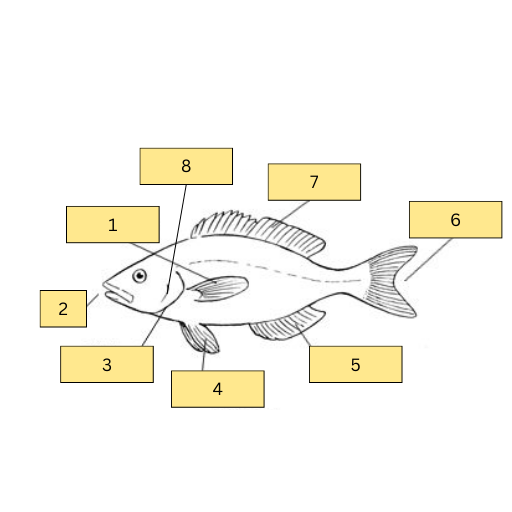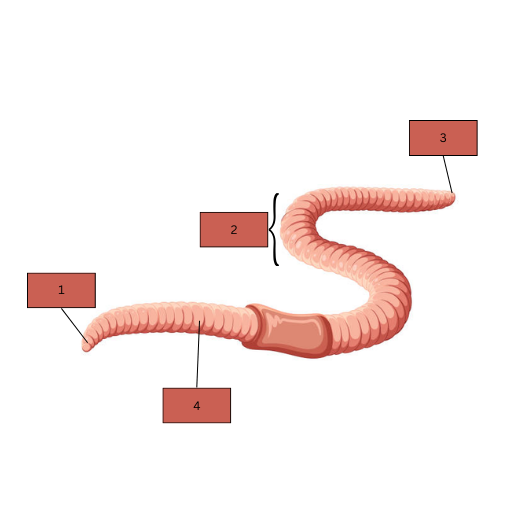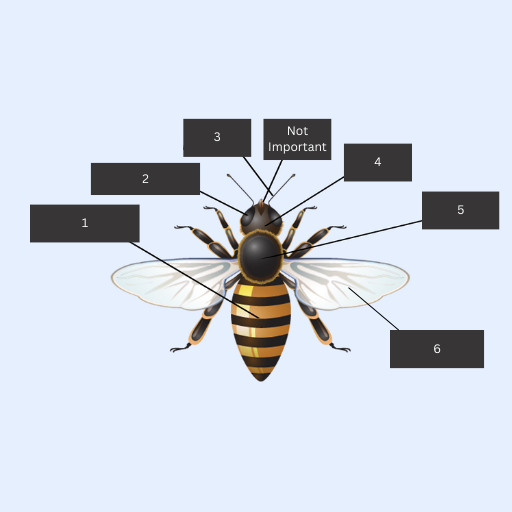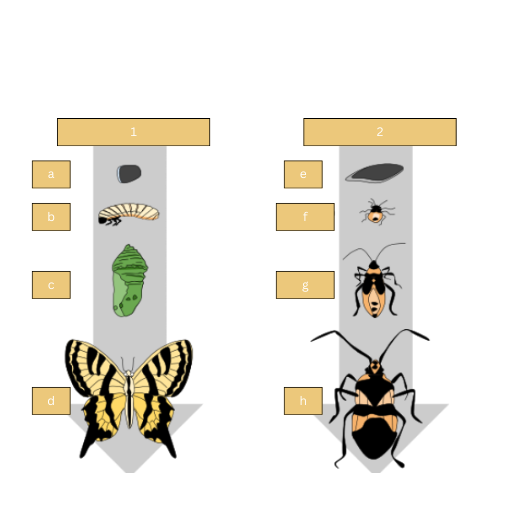Animal Kingdom
1/16
Earn XP
Description and Tags
Name | Mastery | Learn | Test | Matching | Spaced | Call with Kai |
|---|
No analytics yet
Send a link to your students to track their progress
17 Terms
Mention 3 characteristics common to all animals
Multicellular (Eukaryotic)
Store Carbohydrates as Glycogen in Liver
Heterotrophic
State whether the statements are true or false (if false rewrite the correct statement)
All animals belong to the Kingdom: Animal
Vertebrates and Invertebrates are Phyla
The following are all Phyla: Crustaceans, Insects, Myriapods, Arachnids
Cnidaria is the Class of Jellyfish
These are all Classes: Fish, Amphibians, Reptiles, Birds, Mammals
These are all the invertebrate Phyla: Platyhelminthes, Nematodes, Annelids, Mollucs, Arthropods
True
False: Vertebrates is a Phylum, but Invertebrates is not
False: Those are all Classes of the Phyla: Arthropods
False: Cnidaria is the Phylum of Jellyfish
True
False: Those are 5/6 of all invertebrate Phyla, the 6th one is Cnidaria
Mention 4 characteristics of Fish
Ectothermic
Aquatic
Stream-Lined Body: Facilitates movement in water
Body covered in Scales

Name labels 1-8
Pectoral Fin
Mouth
Gill Slit
Pelvic Fin
Anal Fin
Tail / Caudal Fin
Dorsal Fin
Operculum
Fill in the blanks: Amphibians are _____ (they regulate their body temperature by the external environment). They have a metamorphosis life cycle in which _____ are laid in _____, _____ live in _____ and _____ live in _____ and on ____. Tadpoles have _____ while adults have _____. Adults also have a _____ and ______ skin to facilitate _____. The feet of adult amphibians are _____
Amphibians are ectotherms (they regulate their body temperature by the external environment). They have a metamorphosis life cycle in which eggs are laid in water, younglings live in water and adults live in water and on land. Tadpoles have gills while adults have lungs. Adults also have a thin and moist skin to facilitate diffusion. The feet of adult amphibians are webbed
Select the correct answer in each statement regarding reptiles:
1. Reptiles are (endotherms/ectotherms)
2. They have a (dry and scaley/moist and thin) skin
3. They perform gas exchange by using (lungs/gills)
4. They live (on land/mainly on land but sometimes in water/in water)
5. They (give birth/lay leathery eggs)
1. Reptiles are (endotherms/ectotherms)
2. They have a (dry and scaley/moist and thin) skin
3. They perform gas exchange using (lungs/gills)
4. They live (on land/mainly on land but sometimes in water/in water)
5. They (give birth/lay leathery eggs)
Name the 2 Endothermic vertebrates
Mammals and Birds
The following statements either apply to Birds or to Mammals, put them in the correct category:
Body covered in feathers
Lay hard protective eggs
External ears
Wings instead of front limbs
Give birth
Have mammary glands
Have a beak
Body covered in hair/fur
Have lungs and a diaphragm
Birds: 1, 2, 4, 7
Mammals, 3, 5, 6, 8, 9
Mention 1 local example of each vertebrate class
Fish: Blackmouth Catshark
Amphibians: Painted Frog
Reptiles: Lizards
Birds: Barn Owl
Mammals: Humans
Fill in the blanks: The jellyfish and the _____ both belong to the _____ phylum. All animals in this phylum are _____ have a _____-_____ body, have _____ body opening/s, and have _____ with _____ cells
The jellyfish and the hydra both belong to the cnidaria phylum. All animals in this phylum are aquatic have a sac-like body, have one body opening, and have tenticels with stinging cells
Fill in the blanks: The _____ is a great example of the phylum Platyhelminthes. All of such animals have a _____ _____ to facilitate diffusion and most of them are _____
The tapeworm is a great example of the phylum Platyhelminthes. All of such animals have a flat body to facilitate diffusion and most of them are parasitic
Fill in the blanks: The askaris belongs to the _____ phylum. Animals like the askaris have a _____, _____-_____ body which is _____ in cross-section. Some of these animals live in the _____ and most are _____
The askaris belongs to the nematodes phylum. Animals like the askaris have a long, thread-like body which is circular in cross-section. Some of these animals live in the soil and most are parasitic

Fill in the blanks: Animals belonging to the _____ phylum have a complete digestive system with 2 body openings and have a long and _____ body. An animal of this category is the _____ (shown in the diagram); this animal barrows in the _____ to create tunnels for _____ and _____. They also consume _____ and _____ matter to form _____ _____. Number 1 shows its _____ whilst 3 shows its _____. 2 shows how its body is _____ and 4 shows its _____ which is _____, _____, and _____ to facilitate _____ and _____ in soil
Animals belonging to the annelids phylum have a complete digestive system with 2 body openings and have a long and segmented body. An animal of this category is the earthworm (shown in the diagram); this animal barrows in the soil to create tunnels for air and water. They also consume soil and organic matter to form soil hummus. Number 1 shows its head/mouth whilst 3 shows its anus. 2 shows how its body is segmented and 4 shows its skin which is thin, moist, and slimey to facilitate diffusion and movement in soil
Fill in the blanks: The animals in the phylum of _____ have these characteristics: _____ _____, exoskeleton (containing _____), and _____ eyes
This phylum is divided into the following classes:
Myriapods (such as _____): they have _____ pairs of legs per _____
Arachnids (such as _____): they have _____ pairs of legs
Crustaceans (such as _____): they have _____ or more pairs of legs
Insects (such as _____): they have _____ pairs of legs
The animals in the phylum of arthropods have these characteristics: jointed appendiges, exoskeleton (containing chiting), and compound eyes
This phylum is divided into the following classes:
Myriapods (such as centipedes): they have 1 or 2 pairs of legs per segment
Arachnids (such as spiders): they have four pairs of legs
Crustaceans (such as crabs): they have four or more pairs of legs
Insects (such as bees): they have three pairs of legs

Fill in the blanks: This is a bee which belongs to the phylum _____ and class _____. Its body is divided into 4; ______, 5; ______, and 1; _____. Bees and other animals of the same class have _____ pair/s of _____ (number 3), _____ pair/s of _____ (number 2) and generally _____ pair/s of _____ (number 6)
This is a bee which belongs to the phylum arthropods and class insects. Its body is divided into 4; head, 5; thorax, and 1; abdomen. Bees and other animals of the same class have one pair of antennae (number 3), one pair of compound eyes (number 2) and generally two pairs of wings (number 6)

Rewrite this statement but replace the numbers/letters with the correct terminology:
Insects’ life cycles can either be 1 or 2. In 1 the cycle goes like this; a, b, c, d. In 2 the cycle goes like this; e, f, g, h
Insects’ life cycles can either be complete metamorphosis or incomplete metamorphosis. In complete metamorphosis the cycle goes like this; egg, larva, pupa, adult. In incomplete metamorphosis the cycle goes like this; egg, nymph/instar, several moulting events, adult
In which kingdom and phylum does the snail belong? Mention 3 characteristics of its phylum
Kingdom: Animal
Phylum: Mollusc
Characteristics:
Soft, unsegmented body
Internal or external shell
Live in aquatic or moist environments